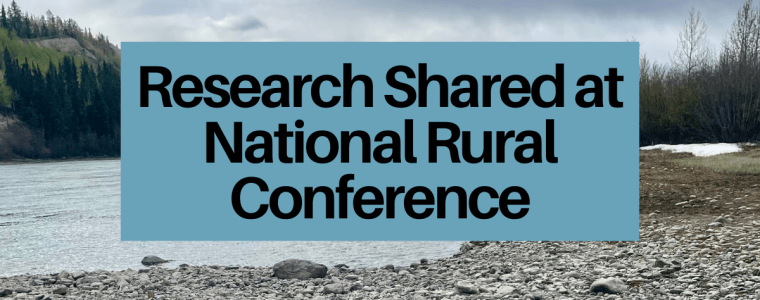
The Canadian Rural Revitalization Foundation and Yukon University recently co-hosted the Northern Dialogues: Remoteness and Sustainable Livelihoods in Rural and Northern Canada Conference in Whitehorse, Yukon. The conference addressed the intersection of remoteness and sustainable livelihoods framed across three interrelated themes: (i) innovation and community development, (ii) education, health, and social systems, and (iii) culture, heritage, and wellbeing.
Over the four-day conference, knowledge emerging from the School of Environmental Design and Rural Development was well represented. The following presentations, panel discussions, and posters were shared:
- Addressing labour shortages through newcomer attraction in rural Ontario and British Columbia John Dale and Ryan Gibson
- Braiding Food Systems: Co-Constructing Sustainable Seed Systems with Northern Ontario First Nations – Charlotte Potter, Silvia Sarapura, Paul Benalcazar, Annette Peltier-Flamand, and Corina Thompson
- Breaking path dependency? Factors to enhance capacity for rural local governments in Newfoundland and Labrador, Canada Josh Barrett
- Exploring Northern Attitudes: “Main Street Town Square” Pedestrian Pilot Project in Downtown Whitehorse Cathy Wan Yi Lin and Sara Epp
- Exploring the impact and potential of place-based philanthropy for community development in rural and northern Canada Alex Petric, Ryan Gibson, Sean Markey, Kelly Vodden
- Home on Borrowed Land: Residential land leasing and housing attainability in the Northwest Territories Chris Van Dyke
- Rural Equity in Emergency Planning: A Public Health Agenda Danica Fitzsimmons, Amanda Mongeon, Keltie Hamilton
A brief description of each conference contribution can be found online.
The Canadian Rural Revitalization Foundation was established in 1989 to contribute to the revitalization and sustainability of rural Canada through collaborative research for rural leaders in the community, private sector, and in all levels of government. The Foundation works to create credible insights and to improve our understanding of issues and opportunities that are of common interest to rural residents across Canada. Knowledge and better understanding are the fundamental pillars for the welfare of rural communities and environments.





